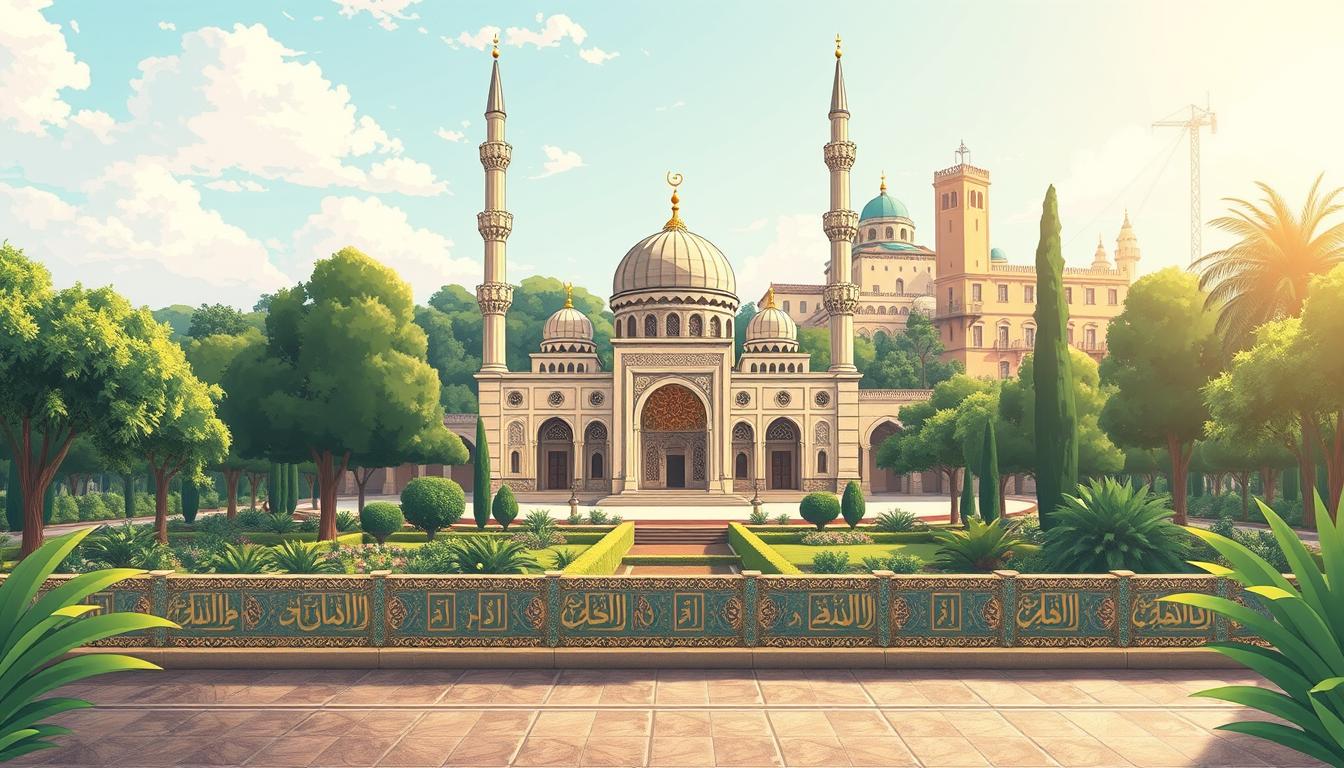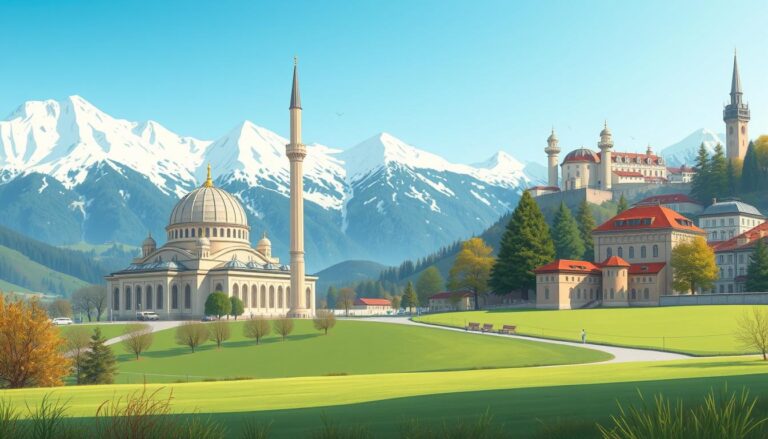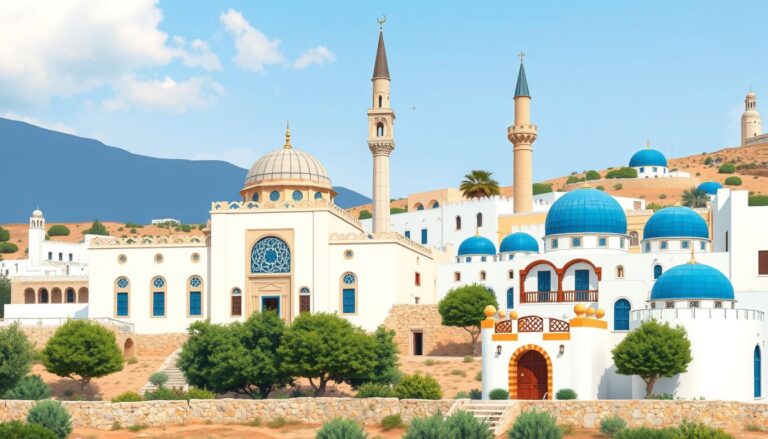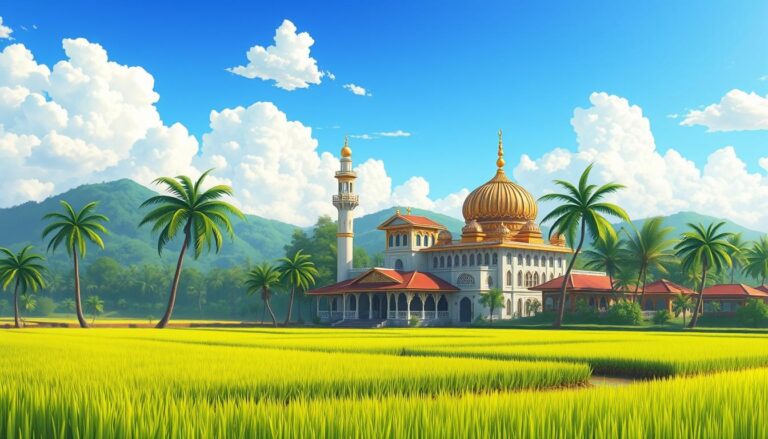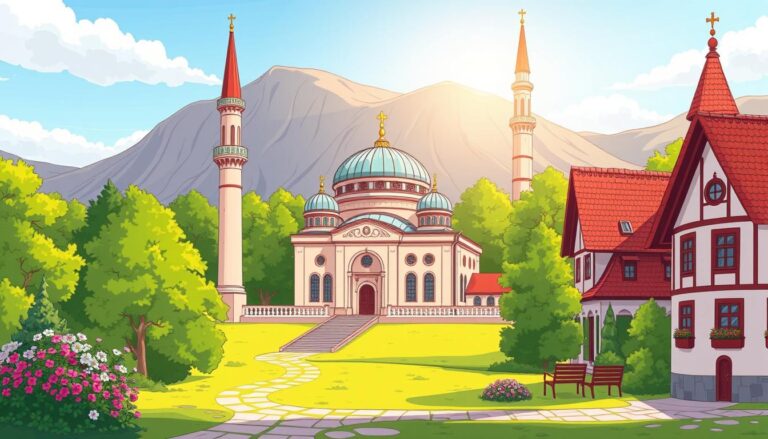Islam in Portugal
According to the 2021 census, Muslims represent around 0.4% of the total population of Portugal. However, the roots of Islam in this Iberian nation run deep, dating back to the 8th century when the Umayyad Caliphate conquered the Iberian Peninsula. By the year 1000, Islamic rule was still prevalent in much of what is now Portugal, leaving an indelible mark on the country’s culture, language, and architectural heritage.
From the Moorish conquest to the Reconquista, the story of Islam in Portugal is a complex and fascinating one, intertwined with the nation’s broader history. Today, the Muslim community in Portugal continues to evolve, with growing diversity and a strong presence in the country’s social, economic, and cultural fabric.
Key Takeaways
- Muslims represent around 0.4% of the total population of Portugal, with a history dating back to the 8th century Umayyad Caliphate conquest.
- Islam’s presence in Portugal has left a lasting impact on the country’s culture, language, and architecture.
- The Muslim community in Portugal has grown in diversity, with origins from the Middle East, Maghreb, Mozambique, and Bangladesh.
- The Ismaili Muslim community has a significant presence in Portugal, with the Aga Khan Development Network’s global headquarters located in Lisbon.
- Challenges remain in the integration and acceptance of Muslims in Portuguese society, with some political parties proposing to exclude Islamic teachings from public schools.
Brief Overview of Islam’s Presence in Portugal
Islam’s history in Portugal dates back to the early 8th century when the Umayyad conquest of the Iberian Peninsula brought the religion to the region. By the 10th century, it’s estimated that half the population of the Iberian Peninsula was Muslim, highlighting the significant Islamic influence in Portugal during this period.
The Muslim presence in Portugal lasted for several centuries, until the Christian Reconquista in the 13th century. Today, Muslims account for a small minority of the Portuguese population, representing around 0.4% according to the 2021 census. The Muslim community in Portugal is diverse, with the majority being Sunni, followed by approximately 20,000 to 22,000 Shia Muslims, 65% of whom are Ismaili.
Historical Roots and Influence
The history of Islam in Portugal can be traced back to the Umayyad conquest of the Iberian Peninsula in the early 8th century. Over the centuries, the Islamic influence in Portugal left a lasting impact on the country’s language, architecture, and culture. The Portuguese language, for instance, has almost 19,000 words of Arabic origin, highlighting the deep-rooted integration of Islamic elements.
Demographics and Population
Today, the Muslim population in Portugal is a small minority, comprising around 0.4% of the total population according to the 2021 census. However, the community is diverse, with the majority being Sunni Muslims and a significant Shia population, including around 20,000 to 22,000 Ismaili Muslims.
The Muslim community in Portugal has roots in the country’s former overseas provinces, as well as the Middle East, the Maghreb, and South Asia, reflecting the diverse origins of Portugal’s Muslim population.
The Moorish Conquest and Golden Age
The Moorish conquest of Portugal, or the Iberian Peninsula, began in 711 AD when the Umayyad Caliphate, a powerful Islamic dynasty, invaded the Visigothic Kingdom that controlled the region at the time. Over the next century, the Umayyad Caliphate expanded its rule across much of the Iberian Peninsula, establishing the region of al-Andalus, which included the territory of modern-day Portugal.
Expansion of the Umayyad Caliphate
The Umayyad Caliphate’s expansion into the Iberian Peninsula was rapid and far-reaching. By 698, northern Africa had fallen under Muslim control, with the Berber and urban populations gradually converting to Islam and adopting the Arabic language. The Islamic conquest of Portugal, or al-Gharb as it was known, was part of this broader expansion of the Umayyad Caliphate.
Contributions to Arts, Sciences, and Culture
During the Moorish Golden Age, the Muslim rule in Portugal (al-Gharb) contributed significantly to advancements in art, science, and culture. The Moors introduced innovations in architecture, mathematics, astronomy, medicine, and other fields, helping to usher the region out of the Dark Ages. This legacy can still be seen in the architectural and linguistic influences that remain in Portugal today.
The Islamic presence in cities like Coimbra, Santarém, and Lisbon lasted for centuries, leaving a lasting impact on the local culture, language, and society. The Arab influence can be seen in the remnants of mosques that were later converted into churches, as well as in the Moorish-inspired architecture that can still be found throughout Portugal.
“The Moorish conquest of Portugal marked a significant chapter in the country’s history, ushering in a golden age of cultural and scientific advancements that continue to influence Portuguese identity today.”
The Reconquista and Decline of Muslim Rule
The Christian Reconquista, a long-standing movement to expel the Muslims from the Iberian Peninsula, gradually reclaimed the territory of modern-day Portugal over the course of the 12th and 13th centuries. By 1249, the last Muslim stronghold in the Algarve region was captured by King Afonso III of Portugal. This marked the end of the Moorish presence that had lasted for centuries in the region.
The decline of Muslim rule in Portugal was a complex process that unfolded over several centuries. The Reconquista, which began around the late 10th century, culminated in 1492 with the fall of the Nasrid kingdom of Granada to the Catholic Monarchs. During this time, approximately three million Muslims emigrated or were driven out of Spain between 1492 and 1610, as a result of the Alhambra Decree and subsequent edicts that forced the conversions of Muslims in Castile, Navarre, and Aragon.
The Christian conquest of Muslim territories in Portugal was facilitated by a series of decisive battles, including the Battle of Las Navas de Tolosa (1212), the Siege of Córdoba (1236), and the Siege of Seville (1248). These victories allowed the Christian forces to gradually take control of the Iberian Peninsula, with the final Muslim enclave of Granada becoming a tributary state by 1248.
“The term Reconquista was consolidated in Spanish historiography in the second half of the 19th century, associated with the development of Spanish national identity.”
While most Muslims were either killed, forced to flee, or converted to Christianity, a small minority was allowed to remain in segregated neighborhoods. The decline of Muslim rule in Portugal marked the end of the Moorish presence that had lasted for centuries, leading to the country becoming an overwhelmingly Christian-majority nation.
Remnants of Islamic Heritage and Architecture
Despite the decline of Muslim rule in Portugal, the country still bears the indelible mark of the Moorish presence, particularly in the south. From the partially preserved medieval mosque in the town of Mértola to the Moorish architectural influences seen in iconic landmarks like the Peña Palace in Sintra and the Belem Tower in Lisbon, the Islamic heritage of Portugal remains a significant part of its cultural fabric.
Mosques Converted into Churches
The town of Mértola in the Alentejo region holds a unique treasure – the only partially remaining medieval mosque in Portugal, which was later converted into a Catholic church. The original horseshoe arches of the mosque are still intact, serving as a tangible reminder of the region’s Islamic past.
Moorish Influences in Portuguese Language
The influence of the Moors can also be seen in the Portuguese language, which retains numerous words and expressions of Arabic origin. These linguistic remnants are a testament to the centuries-long Islamic presence in the region and the enduring impact of the Moorish culture on Portugal’s identity.
From architectural marvels to linguistic nuances, the Islamic heritage in Portugal continues to captivate visitors and scholars alike, serving as a bridge between the country’s past and present.
“Mértola was an independent Islamic kingdom during the 11th and 12th centuries and currently celebrates a biennial Islamic festival.”
Modern Muslim Communities in Portugal
While Muslims once made up a much larger proportion of Portugal’s population, today they represent a small minority, accounting for around 0.4% of the total population. The modern Muslim community in Portugal is diverse, with the majority being Sunni Muslims, followed by a significant Shia minority, particularly the Ismaili branch.
Most of the current Muslim population in Portugal has roots in the former Portuguese overseas provinces, the Middle East, the Maghreb, and South Asia. The Muslim community has grown in recent decades due to immigration, with many arriving as refugees or migrant workers. This has contributed to demographic changes and the increased visibility of Islam in Portugal, though the community remains a small percentage of the overall population.
Immigration and Demographic Changes
Significant groups of the Portuguese Muslim community originated from Mozambique, Guinea-Bissau, and India, having integrated into Portuguese society for several decades, identifying as “Portuguese Muslims.” The Portuguese Muslim community consists of Sunnis and Shiite Ismailis, with a notable number of Ismailis coming from former Portuguese territories like Goa, Damão, and Diu.
The traditional Portuguese Muslim community comprises educated middle and upper-class individuals, with successful careers in business and close ties to Portuguese economic and political elites. However, the modern Muslim communities in Portugal have also seen an influx of Muslim immigrants in recent years, contributing to demographic changes within the population.
Islam in Portugal
Islam’s presence in Portugal dates back centuries, stemming from the Moorish conquest of the Iberian Peninsula in the 8th century. While Muslims once made up a significant portion of the population, today they represent a small minority, accounting for around 0.4% of the total population according to the 2021 census.
The Muslim community in Portugal is diverse, with the majority being Sunni Muslims, followed by a Shia minority, particularly the Ismaili branch. Most of the Muslim population has origins in the former Portuguese overseas provinces, the Middle East, the Maghreb, and South Asia, with many arriving as immigrants or refugees in recent decades.
Despite their small numbers, Muslims in Portugal continue to maintain a presence and contribute to the country’s cultural fabric. Over 1,000 words of Arabic origin survive in modern Portuguese, and many place names in Portugal derive from Arabic. Additionally, the cuisine in the Algarve and Alentejo regions has been influenced by Arab dishes.
While the Muslim population in Portugal remains a minority, the country’s long history of religious diversity and tolerance has allowed for the integration and preservation of Islamic heritage. As Portugal continues to evolve, the role and influence of the Muslim community will likely continue to be a part of the nation’s cultural tapestry.
“Scientists estimate that a third of the present population of Portugal have either Muslim or Jewish ancestry.”
The 2021 Census data reveals that the majority of the population in Portugal, around 80.20%, identifies as Catholic, representing the largest religious group. In contrast, the data shows that 0.42% of the population adheres to Islam, with a slight increase from the previous census.
- The region with the highest percentage of Catholics is the Azores with 91.6%, while the Algarve and the Lisbon region have the lowest percentages of Catholics at 65.9% and 67.5%, respectively.
- 14.09% of the population in Portugal has no religious affiliation, as per the 2021 Census.
- There is a difference in religious composition between Portuguese nationals and foreign residents in Portugal, with 82.6% of Portuguese nationals affiliated with the Catholic Church compared to 36.4% among foreigners.
Despite the small Muslim population, the influence of Islam in Portugal’s history and culture remains significant. As the country continues to evolve, the role and integration of the Muslim community will likely be an ongoing area of interest and discussion.
The Ismaili Muslim Community in Portugal
The Ismaili Muslim community is an integral part of Portugal’s diverse religious landscape, making up around 65% of the Shia Muslim minority. In 2015, the city of Lisbon was chosen as the global seat of the Nizari Isma’ili community, the second-largest Shia denomination in the world. This significant decision was marked by the signing of an agreement between the Republic of Portugal and the Ismaili Imamat, leading to the Aga Khan Development Network (AKDN) establishing a strong presence in the country.
The AKDN has made substantial investments in Portugal, including the acquisition of the Henrique de Mendonça Palace to serve as the new global headquarters for the Ismaili Imamat. This partnership has fostered increased cooperation between Portugal and the Ismaili community, with a focus on supporting research, the knowledge society, and enhancing the quality of life for Portugal’s inhabitants.
The Aga Khan Development Network’s Presence
The Ismaili Centre in Lisbon, officially opened on July 11, 1998, stands as a testament to the Ismaili community’s influence in Portugal. Covering a vast space of 18,000 square meters, with 12,000 designated for gardens and patios, the center was developed following an international competition with architect Raj Rewal and Frederico Valsassina involved in its design.
The Ismaili Centre in Lisbon takes inspiration from Eastern Islamic and Iberian Peninsula architectural traditions, reflecting the rich cultural heritage of the Ismaili community. Since its establishment, the center has hosted public exhibitions, lectures, and musical programs, serving as a hub for cultural exchange and dialogue.
“The Ismaili Centre in Lisbon was awarded the Portuguese Order of Merit by President Marcelo Rebelo de Sousa on July 13, 2023, recognizing its significant contribution to the cultural and social fabric of the country.”
The Ismaili community’s presence in Portugal has grown steadily since the 1970s, leading to the establishment of the Ismaili Centre in Lisbon and the designation of the city as the global seat of the Nizari Isma’ili community in 2015. This partnership between Portugal and the Ismaili Imamat has fostered a mutually beneficial relationship, promoting cultural exchange, research, and the enhancement of the country’s inhabitants’ quality of life.
Challenges and Integration of Muslims
The Muslim community in Portugal faces various challenges when it comes to integration and acceptance. Despite the long history of Muslim presence in the country, the expulsion of Muslims during the Reconquista and the subsequent erasure of their history from the national narrative have contributed to a lack of awareness and understanding about the Muslim community among the general population.
Furthermore, the rise of far-right political movements in Portugal has led to an increase in Islamophobic rhetoric and policies, such as proposals to exclude the teaching of Islam from public schools. This has created an environment of hostility and discrimination, making it difficult for Muslim immigrants and refugees to fully integrate into Portuguese society.
The barriers to integration go beyond just political and social issues. Muslim immigrants and refugees also face challenges related to language and cultural differences, as well as economic and social marginalization. Many struggle to find employment and housing, further exacerbating the challenges they face in their daily lives.
Addressing these challenges and fostering greater understanding and acceptance of the Muslim community remains an ongoing effort in Portugal. It will require a multi-faceted approach, involving both government and civil society organizations, to promote tolerance, coexistence, and interfaith dialogue.
“The expulsion of Muslims during the Reconquista and the subsequent erasure of their history from the national narrative have contributed to a lack of awareness and understanding about the Muslim community among the general population.”
Despite the obstacles, there are also signs of progress. The Ismaili Muslim community, for instance, has been able to establish a strong presence in Portugal through the Aga Khan Development Network’s initiatives. These efforts help to bridge the gap between the Muslim community and the broader Portuguese society.
As Portugal continues to grapple with the challenges of integrating its Muslim population, it is crucial that all stakeholders work together to promote understanding, respect, and equal opportunities. Only then can the country truly celebrate the diversity and richness that the Muslim community brings to the nation.
Cultural Exchanges and Influence
Despite the decline of Muslim rule in Portugal, the Moorish legacy has left an indelible mark on the country’s culture, including its culinary traditions. The centuries-long presence of the Moors in the Iberian Peninsula has resulted in the incorporation of various Arabic-influenced ingredients, cooking techniques, and dishes into traditional Portuguese cuisine.
The cultural exchange between Portugal and Muslim communities is evident in the widespread use of spices like saffron, the popularity of dishes like açorda (a bread-based soup), and the prevalence of Moorish-inspired pastries and sweets. Additionally, the architectural and linguistic influences of the Moors continue to be celebrated and integrated into Portugal’s cultural identity, reflecting the enduring impact of this historical Islamic presence on the country.
Culinary Traditions and Influences
Biomolecular evidence has identified changing urban economies in multi-faith medieval Portugal, indicating that dietary influences extended beyond just faith-based practices. Stable isotope analysis in Medieval Tomar, Portugal, even inferred potential influence of military orders on the general population’s diet. This cultural exchange is further highlighted by investigations into residential mobility and dental decoration in early medieval Spain, which provided insights into the dietary habits among the population.
“The exchange of cultural influences is visible in the artistic representations found in monuments and portable objects.”
The Moorish influence on Portuguese cuisine is not limited to specific dishes; it has also shaped the country’s culinary traditions and techniques. From the use of spices to the preparation of certain foods, the Moorish legacy continues to be celebrated and integrated into the cultural identity of Portugal, reflecting the enduring impact of this historical Islamic presence.
Education and Understanding of Islamic Heritage
In Portugal, the history of Islam’s presence is often overshadowed or overlooked in the country’s education system and national narratives. Textbooks and curricula tend to emphasize the Reconquista and the Christian reclamation of the Iberian Peninsula, while the centuries of coexistence and cultural exchange between Muslims, Christians, and Jews are given less attention. This lack of comprehensive coverage in the education system contributes to a limited understanding and awareness of the Moorish legacy and its lasting impact on Portuguese culture and society.
Calls have been made by members of the Muslim community and historians to better integrate the rich Islamic heritage into the educational curriculum. This would foster greater appreciation and dialogue around this important aspect of Portugal’s past. Over 500 years, Portugal lived under Islamic rule starting in the early 8th century, and the influence of Arab rule in Portugal is intangible but significant, with Arabic-origin words in the Portuguese language.
However, Portugal’s history shows little investment in grandiose Islamic construction compared to neighboring Andalusia. The country’s best-known example of Islamic architecture is in Mértola, where a former mosque recalls the Arab past. A renewed interest in Portugal’s Arab legacy can be seen with the opening of a museum in Tavira, and a Master in Islamic and Medieval Mediterranean History program is now available at universities in Portugal, with tuition fees ranging from 1200€ to 2000€ per year for national and international students, respectively.
By better representing the Awareness of Muslim history in Portugal and the Representation of Muslim history in Portuguese curriculum, the education system can help foster a deeper Islamic heritage education in Portugal, allowing students to appreciate the country’s diverse cultural heritage.
“The influence of Arab rule in Portugal is intangible but significant, with Arabic-origin words in the Portuguese language.”
Tolerance, Coexistence, and Interfaith Dialogue
Portugal has a long and complex history of religious interactions, but in the modern era, the country has generally maintained a spirit of religious tolerance and coexistence. The secular nature of the Portuguese constitution allows for the free practice of Islam and other faiths, and the Muslim community has been able to establish mosques and Islamic institutions throughout the country.
Moreover, there are ongoing efforts to promote interfaith dialogue and understanding in Portugal. Cultural events and initiatives that celebrate the diverse religious heritage of the country have become increasingly common, fostering a climate of mutual respect and appreciation. While challenges and instances of Islamophobia remain, the overall atmosphere in Portugal is one of relative tolerance and acceptance of the Muslim minority, reflecting the country’s commitment to pluralism and the legacy of past periods of religious coexistence.
“Portugal has long been a model of religious tolerance, with Muslims, Christians, and Jews coexisting peacefully for centuries. This spirit of coexistence and interfaith dialogue continues to this day, making Portugal a beacon of hope in an often-divided world.”
The Coexistence of religions in Portugal is particularly evident in the shared cultural heritage and architectural influences that can be found throughout the country. Many former mosques have been converted into churches, yet their Moorish architectural elements remain, serving as a testament to the country’s rich history of interfaith dialogue and exchange.
Despite the complex history, Portugal’s commitment to religious tolerance and interfaith dialogue has been a hallmark of the country’s identity. As the Muslim community continues to grow and integrate into Portuguese society, the future of coexistence of religions in Portugal looks promising, with the potential for further cultural exchange and mutual understanding.
Conclusion
Islam has a rich and complex history in Portugal, dating back to the Moorish conquest of the Iberian Peninsula in the 8th century. Although Muslims once made up a significant portion of the population, today they represent a small minority, accounting for around 0.4% of the total population. Despite the decline of Muslim rule and the subsequent efforts to erase their legacy, remnants of the Moorish presence can still be found in Portugal’s architecture, language, and culinary traditions.
The modern Muslim community in Portugal is diverse, with a mix of Sunni, Shia, and Ismaili adherents, many of whom have roots in the country’s former overseas territories or have arrived more recently as immigrants and refugees. While the Muslim community faces challenges in terms of integration and acceptance, Portugal has generally maintained a climate of religious tolerance and coexistence, reflecting the enduring impact of the Moorish legacy and the country’s commitment to pluralism.
Overall, the story of Islam in Portugal is one of resilience, adaptation, and the lasting influence of a culture that once thrived on the Iberian Peninsula. As the country continues to evolve, the Muslim community in Portugal will undoubtedly play a role in shaping its future, contributing to the rich tapestry of religious and cultural diversity that defines this unique European nation.
Source Links
- Islam in Portugal
- The Portuguese rediscovering their country’s Muslim past
- Islam in Portuguese-Speaking Areas
- Islamic traces in Portugal’s past
- Moors
- Moorish Portugal
- Reconquista
- Reconquista | Definition, History, Significance, & Facts
- Spain – Muslim Rule, Reconquista, Culture
- The Vestiges of Southern Portugal’s Islamic Empire
- Echoes of al-Andalus: The Portuguese town celebrating its forgotten Islamic past
- Jihadism in Portugal: Grasping a Nebulous Reality (ARI) – Elcano Royal Institute
- Islamic History of Portugal
- Religion in Portugal
- How Portugal has largely avoided racism and Islamophobia amid a migration boom
- Ismaili Centre, Lisbon
- The Ismaili Imamat
- 1
- Exploring Muslims’ Health-Related Behaviours in Portugal: Any Impact on Quotidian Community Pharmacy Practice?
- Shrouded in history: Unveiling the ways of life of an early Muslim population in Santarém, Portugal (8th– 10th century AD)
- The Islamic Iberian Peninsula: Cultural Fusion and Coexistence
- Artistic Interaction among Cultures in Medieval Iberia | Essay | The Metropolitan Museum of Art | Heilbrunn Timeline of Art History
- The Islamic heritage in Portugal’s past – The World from PRX
- Islamic and Medieval Mediterranean History
- Interfaith Institute of Long Island | Peaceful Coexistence
- Explaining Interfaith Dialogue in the Muslim World | Politics and Religion | Cambridge Core
- Portugal – United States Department of State
- 413-422_Nielsen_F37.indd

